 7 citations,
May 2013 in “Optometry and vision science”
7 citations,
May 2013 in “Optometry and vision science” Bimatoprost can help regrow eyelashes in people with trichotillomania.

Injectable PRF therapy may help with hair growth and skin rejuvenation, but more research is needed.

Hair analysis can help identify specific minerals and amino acids linked to various diseases.
 December 2023 in “International Journal For Multidisciplinary Research”
December 2023 in “International Journal For Multidisciplinary Research” Indian medicinal plants can help with hair growth and common hair issues.
 March 2023 in “East African scholars journal of medical sciences”
March 2023 in “East African scholars journal of medical sciences” Metformin may help regulate periods and cause modest weight loss in PCOS patients, but more research is needed.
 January 2023 in “Brazilian Journals Editora eBooks”
January 2023 in “Brazilian Journals Editora eBooks” Passiflora incarnata may help with anxiety and sleep issues but has side effects; teleconsultation for heart failure can improve quality of life; increased screen time for children during the pandemic led to more clinical complaints; older and severely affected COVID-19 patients are more likely to have long-term symptoms.
 January 2017 in “Clinical approaches and procedures in cosmetic dermatology”
January 2017 in “Clinical approaches and procedures in cosmetic dermatology” Men are increasingly seeking quick-result cosmetic treatments for their thicker, oilier skin and hair loss issues.
 January 2023 in “Brazilian Journals Editora eBooks”
January 2023 in “Brazilian Journals Editora eBooks” The document concludes that Passiflora incarnata may help with anxiety, healthcare workers need mental support, common bacteria cause hospital UTIs, telehealth for heart failure needs research, kids' screen time has increased, pregnant teens are mostly okay with their body image, diagnosing post-surgery tuberculosis is hard, older and severely ill people are more likely to have long COVID symptoms, and psychiatrists should be part of pain management teams.
 January 2023 in “Brazilian Journals Editora eBooks”
January 2023 in “Brazilian Journals Editora eBooks” The document concludes that Passiflora incarnata could help with anxiety, telemedicine might improve heart failure care, screen time for kids has increased, pregnant teens in Brazil are mostly okay with their body image, rare tuberculosis infection can occur after knee surgery, older and severely ill people are more likely to have long COVID-19 symptoms, HPLC might diagnose more diabetes cases, and psychiatrists should be involved in pain management.
 January 2017 in “Acta dermato-venereologica”
January 2017 in “Acta dermato-venereologica” The congress showed that psychological therapy can help skin condition patients, social media affects acne stigma, education improves atopic dermatitis, and patient satisfaction in dermatology is high, especially with good doctor engagement.
 180 citations,
September 1999 in “British Journal of Dermatology”
180 citations,
September 1999 in “British Journal of Dermatology” Hair loss affects self-esteem and quality of life; treatments can help.
 January 2023 in “Brazilian Journals Editora eBooks”
January 2023 in “Brazilian Journals Editora eBooks” Psychiatrists are crucial in pain management teams because they help treat severe pain and related mental health issues.
 10 citations,
December 2021 in “Frontiers in cell and developmental biology”
10 citations,
December 2021 in “Frontiers in cell and developmental biology” Glypican-1 is important for blood vessel growth in hair follicles and could help treat hair loss.
 53 citations,
October 2018 in “Aesthetic Surgery Journal”
53 citations,
October 2018 in “Aesthetic Surgery Journal” Google Trends data on facial cosmetic procedures matches actual surgery numbers, showing it can help plastic surgeons understand public interest.
 27 citations,
March 1994 in “Harvard Review of Psychiatry”
27 citations,
March 1994 in “Harvard Review of Psychiatry” Behavior therapy and medications, especially clomipramine, can help reduce hair pulling in people with trichotillomania.
 26 citations,
March 2013 in “Journal of Biomedical Materials Research Part A”
26 citations,
March 2013 in “Journal of Biomedical Materials Research Part A” Researchers created a 3D hydrogel that mimics human hair follicles, which may help with hair loss treatments.
 117 citations,
August 2008 in “Sociology of Health and Illness”
117 citations,
August 2008 in “Sociology of Health and Illness” The conclusion is that the increasing use of drugs for lifestyle reasons is a complex issue influenced by corporate profit, consumer behavior, and the medicalization of everyday life, with potential negative effects on personal well-being.
 58 citations,
November 2013 in “Journal of Innovative Optical Health Sciences”
58 citations,
November 2013 in “Journal of Innovative Optical Health Sciences” Multiphoton microscopy is a promising tool for detailed skin imaging and could improve patient care if its challenges are addressed.
 14 citations,
December 2007 in “Journal of The European Academy of Dermatology and Venereology”
14 citations,
December 2007 in “Journal of The European Academy of Dermatology and Venereology” The article concludes that dermatologists should prescribe lifestyle drugs carefully and consider mental health treatments for patients with disorders like BDD.
 2 citations,
April 2021 in “Journal of Cosmetic Dermatology”
2 citations,
April 2021 in “Journal of Cosmetic Dermatology” Hair loss lowers young men's self-esteem, increasing social anxiety and affecting daily life.
 February 2024 in “Hormones”
February 2024 in “Hormones” Future hormone therapy trials should match the diverse needs and priorities of the gender-diverse community.
 42 citations,
October 2011 in “Seminars in Cell & Developmental Biology”
42 citations,
October 2011 in “Seminars in Cell & Developmental Biology” Eph/ephrin signaling is important for skin cell behavior and could be targeted to treat skin diseases.
 8 citations,
April 2014 in “Practical Diabetes”
8 citations,
April 2014 in “Practical Diabetes” Feeling shame can make it harder for people with diabetes to take care of their health.
 1 citations,
January 2024 in “Curēus”
1 citations,
January 2024 in “Curēus” Clinicians should use social and prescription data to track trends in performance-enhancing drug use.
 159 citations,
September 2001 in “European Journal of Cancer Care”
159 citations,
September 2001 in “European Journal of Cancer Care” Chemotherapy-induced hair loss significantly affects patients' well-being, and nurses are key in helping them cope, but more research is needed to find effective treatments.
 103 citations,
December 2011 in “Journal of the American Academy of Dermatology”
103 citations,
December 2011 in “Journal of the American Academy of Dermatology” Chemotherapy often causes temporary hair loss, which is distressing and needs better treatment and support.
 23 citations,
January 1997 in “Computers and Composition”
23 citations,
January 1997 in “Computers and Composition” To stop online sexism, both men and women need to change how they act.
 10 citations,
January 2019 in “The Nurse Practitioner”
10 citations,
January 2019 in “The Nurse Practitioner” PCOS is a common hormonal disorder in women, treated with lifestyle changes, medication, and patient education.
 7 citations,
February 2019 in “Journal of gynecology obstetrics and human reproduction”
7 citations,
February 2019 in “Journal of gynecology obstetrics and human reproduction” People with polycystic ovary syndrome (PCOS) are more likely to have higher levels of depression and anxiety, but their personality traits are similar to those without PCOS.
 May 2012 in “The journal of nervous and mental disease”
May 2012 in “The journal of nervous and mental disease” The book provides comprehensive information on Impulse Control Disorders but lacks definitive evidence for effective treatments.






























